
LE FUTUR PROCHE Idioma francés, Uñas francesas
1. French futur proche: when you speak. First thing: you have to know that it is a time which is generally used in oral, when you speak. It is rather a time that is informal. Then it is used to express an action that is close. 2. French futur proche: when the action is close to happening.
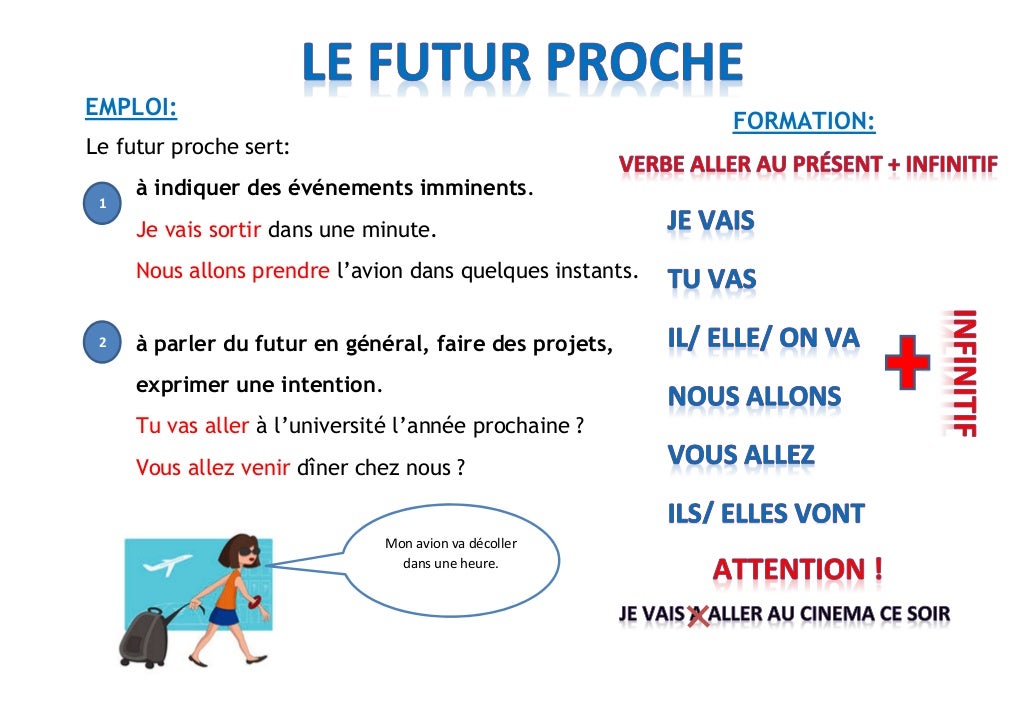
Le futur proche (A1)
Futur simple vs. futur proche. The futur simple and the futur proche are used in different contexts, sometimes comparable to the English will vs. going to:. Use the futur simple:. to express events in the more distant future (signal words: dans une semaine, l'année prochaine. Example: J' habiterai encore à Paris dans deux ans. In two years I will still be living in Paris.

FRANZÖSISCH LERNEN = VERBE = Être = Futur proche YouTube
The 2 French Future Tenses - Futur Proche Vs Futur Simple. Using the futur proche is more and more common in spoken French to describe events taking place in a more or less near future. Unlike English, the use of futur proche in French reinforces the idea that the speaker believes the action will become real.
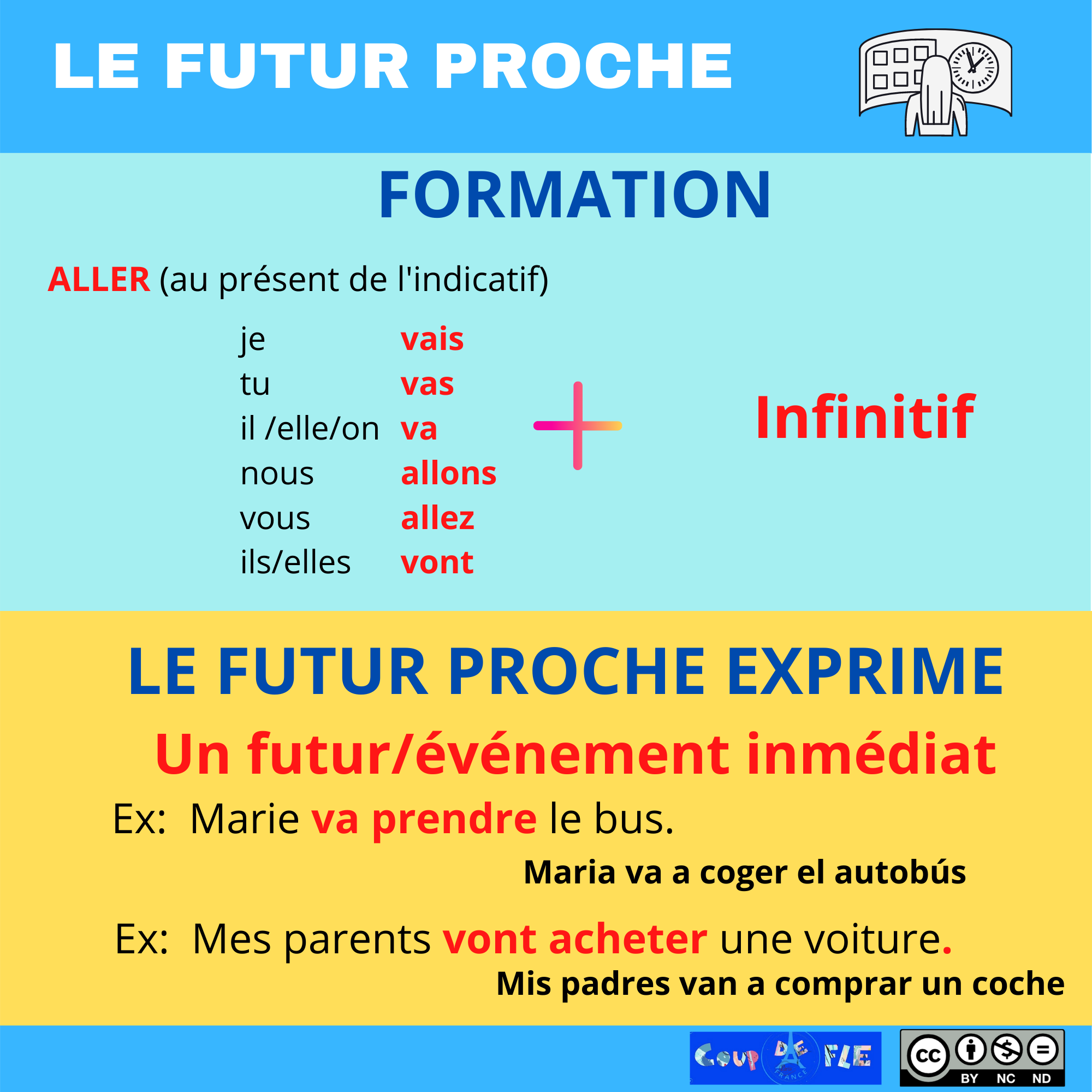
COUP DE FLE Futur proche
Frans: le futur proche. Ik ga zoeken in de tuin. Je vais chercher du jardin.

FUTUR PROCHE ET FUTUR SIMPLE Français FLE fiches pedagogiques pdf & doc
Sometimes mistaken with the present conditional, the futur in French can actually be expressed with two different structures.We generally study the futur once your master the present tense. Although they both express something that will happen in a more or less near future, it is worth pointing out a few differences between futur proche and futur simple in French.

Mi blog de francés Le futur proche
In het Frans zijn er twee vormen van le futur: le futur simple en le futur proche. Wij gaan hier kijken naar le futur proche. Le futur proche is de onvoltooid tegenwoordig toekomende tijd. Je zegt hiermee dat je iets gaat doen. Ik ga naar de supermarkt lopen. Jij gaat naar de groenteboer fietsen. Le futur proche drukt iets uit wat gaat gebeuren.

le futur proche copiar Enseñanza de francés, Aprender francés, Clases de francés
2021 →. The 2020 NFL Draft was the 85th annual meeting of National Football League (NFL) franchises to select newly eligible players for the 2020 NFL season. The first round was held on April 23, followed by the second and third rounds on April 24. The draft concluded with rounds 4-7 on April 25. The NFL originally planned to hold the event.
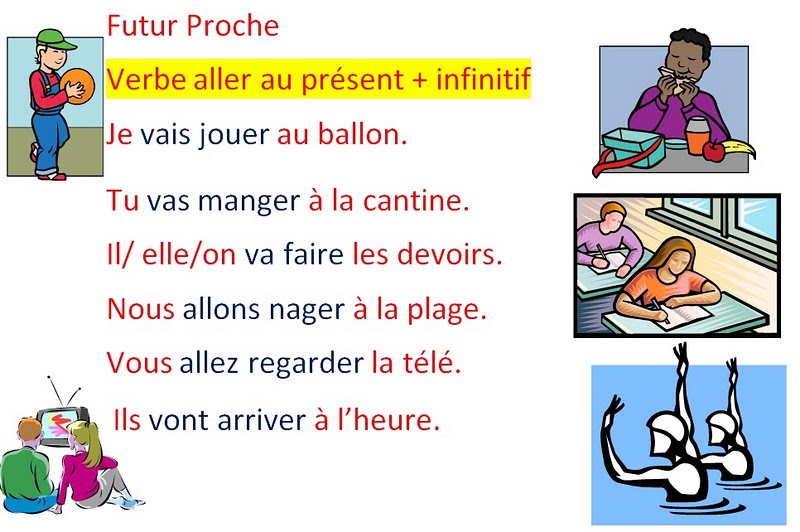
blog Frans voor de leerlingen van de vierdes le futur proche(3) plusieurs exemples
In French grammar, the "futur proche" tense is a way of expressing the near future. It is formed by using the present tense of the verb "aller" (to go) followed by the infinitive of the main verb. For example, "Je vais manger" means "I am going to eat." The futur proche is a relatively simple tense to use, and it is often used in everyday conversation.

French verb conjugation Le futur proche Frans
Present (Présent) Future (Futur Simple) Imperfect (Imparfait) Past (Passé Compose) Conditional (Conditionnel) Imperative (Imperatif) Subjunctive (Subjonctif) Imperfect Subjunctive (Subjonctif Imparfait) Simple Past (Passé Simple) Past Perfect (Plus que Parfait) Practice all your french conjugations and tenses in one place.
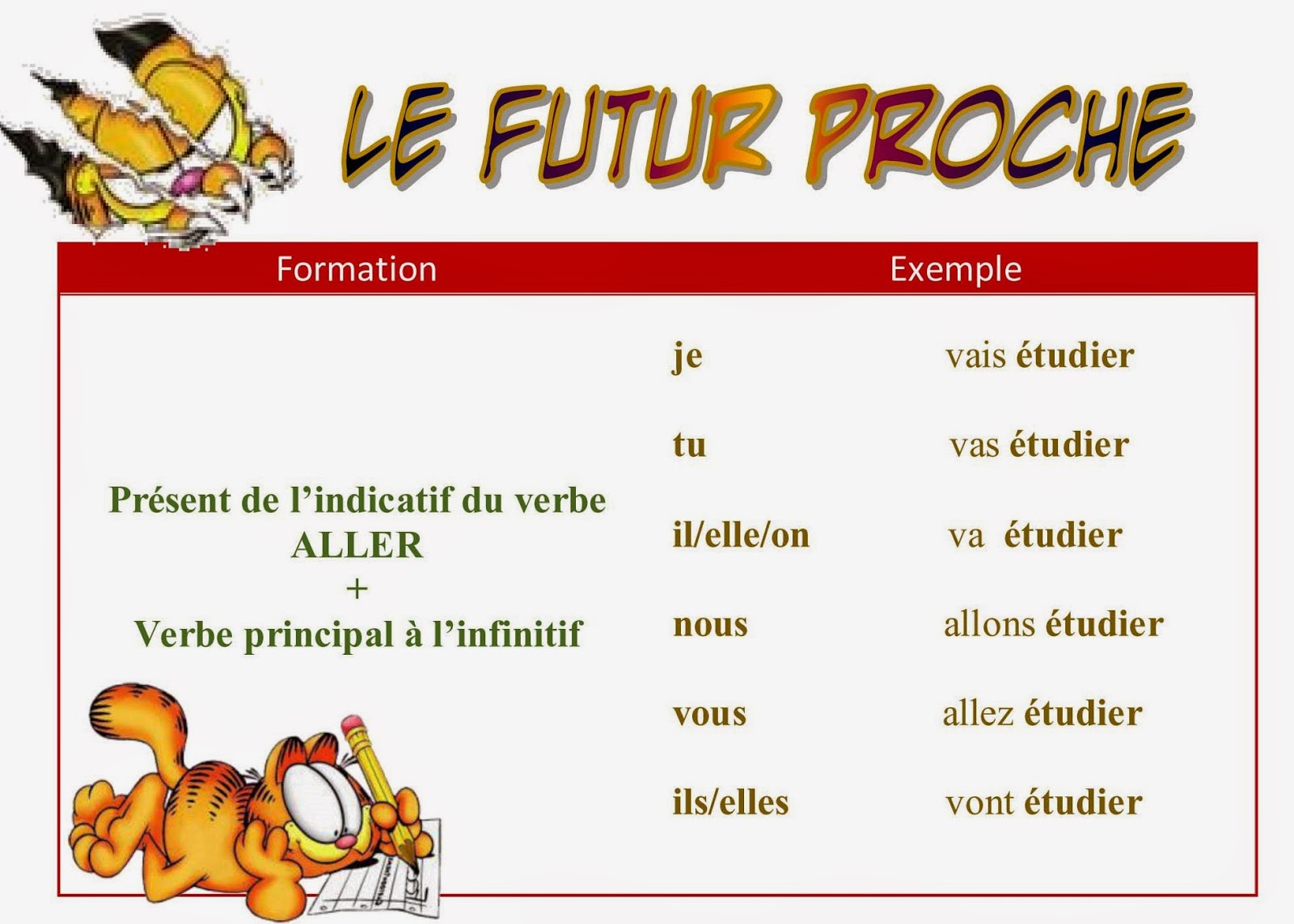
Sixième BLOG FRANCÉS LAS CLARAS DEL MAR MENOR
The futur proche is the first tense you normally learn after the present tense, as it is very easy to use. C - Futur proche: Differences of use between English and French. In French, using the futur proche implies that there will be an upcoming change, something that we are almost certain is going to happen, even it is not in the immediate future.

Lexique pour proposer une sortie + le futur proche in 2022
Le futur proche is a tense that you'll come across in everyday French discussions about future plans.Le futur proche is known in English as the near future tense, while it's also sometimes called le futur immédiat in French.It's sometimes mistakenly spelled by combining the English and French names as "le future proche." Le futur proche is one of the most common ways to talk about.
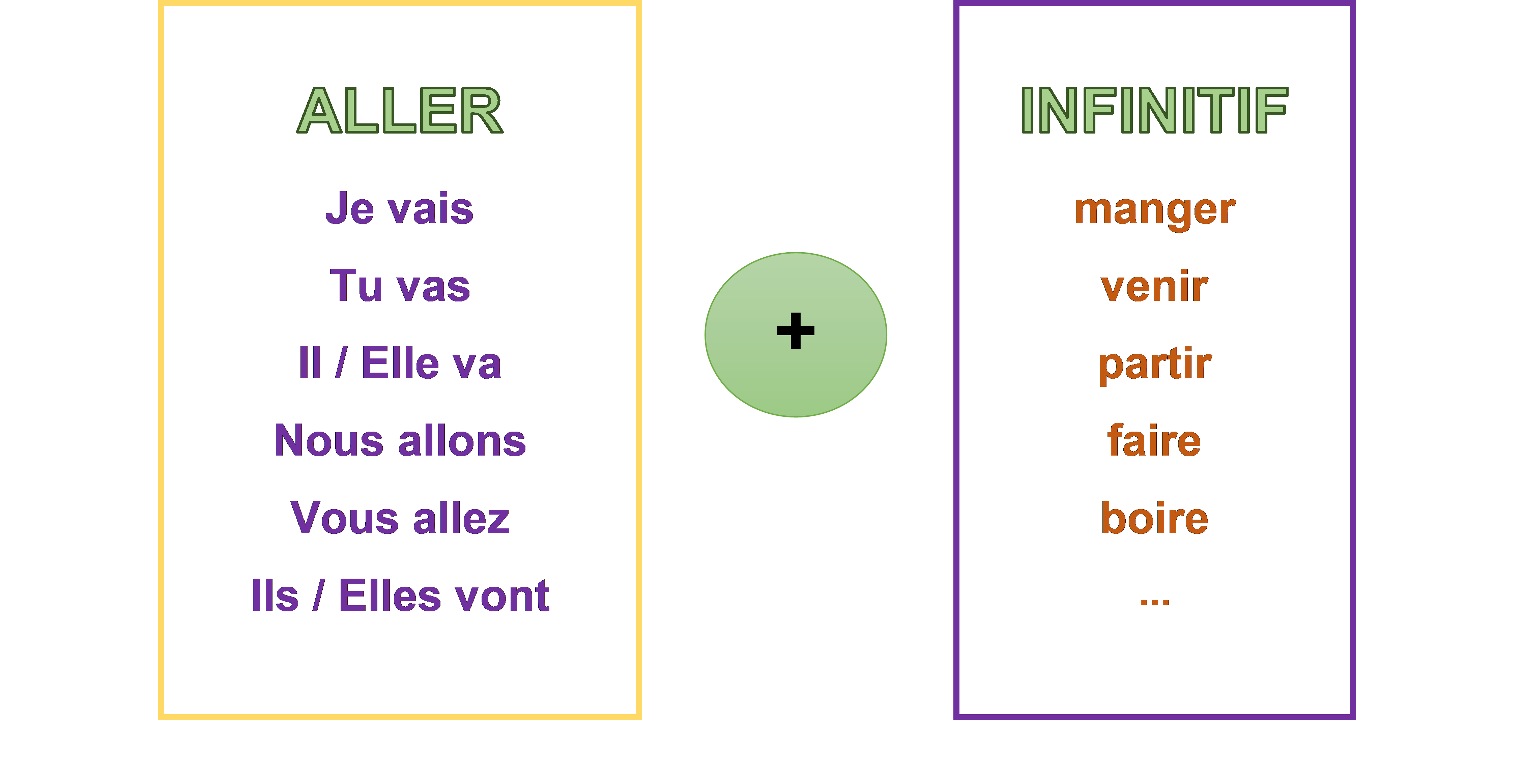
J'apprends le Français Le futur proche (A1)
The future tense in Italian expresses an action that will take place, quite simply, in the future. While in English the future is expressed with the helping verb "will" or the phrase "going to," in Italian, a verb ending marks it as being set in the future tense. Have you ever heard the phrase, "C he sarà, sarà"?

FUTUR PROCHE ET FUTUR SIMPLE Français FLE fiches pedagogiques pdf & doc
Forming "Futur Proche" The futur proche, or near future, is formed by combining the present of aller, which means "to go," with the infinitive of the action verb, a single word that is the basic, unconjugated form of the verb. This makes the futur proche one of the easiest tenses to construct in the French language, and, as such, fairly foolproof. . That said, it does require the user to.

Le futur proche (A1) Mots français, Futur proche exercices, French expressions
THE IDEA IN ENGLISH. As we have already mentioned, the Future proche is the direct translation of the future with going to + infinitive in English. Actually it is easier in French since you can « consume » it as much as you want. Contrary to English where you use the simple future when you wish to make an offer or you want to help, in French.

Pin by Paulina on FLE Conjugaison / Futur Learn french, French flashcards, French language lessons
The futur proche is used for actions in the near future. It corresponds to the English structure going to + infinitive. This tense emphasises that there is already an intention behind the action and that it will shortly take place. Example: je vais aimer/finir/vendre. Le futur simple.
Level A1 Le Futur Proche Love Learning Languages French Academy
FUTUR et CONDITIONNEL - French lesson - future and conditional. Watch on. In the French language, there are 2 future tenses: the « futur proche » and the « futur simple ». Paradoxically, the futur proche is simpler (easier to build) than the futur simple, that's why we use it more.